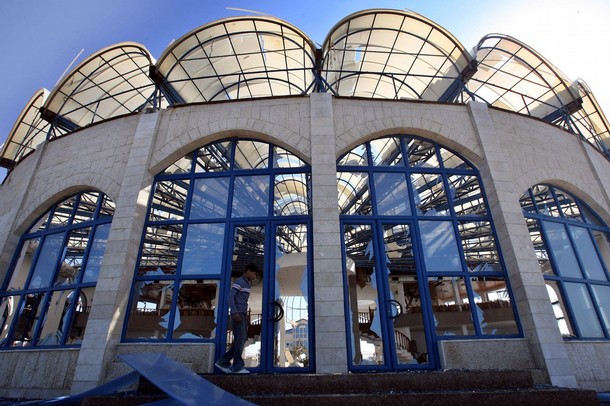A Mujahideen Bleed-Through from Iraq? Part Four – The Case of Palestine and Israel
Publication: Terrorism Focus Volume: 5 Issue: 42
By:

The bleed-through from Iraq also is having some impact in the Palestinian territories – especially Gaza – and in Israel. In these theaters, of course, access to Israeli targets already is assured, and so the emphasis of the newly arrived mujahideen and a number of in-place Israeli Arabs seems to be to build a foothold from which Salafism can be preached and have a chance to grow among the populace. There have been anti-Israeli operations conducted by Salafi groups in Gaza – such as the Jaysh al-Islam (Army of Islam) – but the attacks have not been major, and the Salafis appear to spend just as much time fighting with their erstwhile Islamist colleagues in Hamas.
Al-Qaeda and its Salafi allies have long viewed Palestine as “an Islamic endowment,” a place to which “every Muslim has the right to set out for jihad in its land” (Global Islamic Media Front, November 22). Osama bin Laden, moreover, has long railed against the governments of Jordan, Syria, and Lebanon for preventing non-Palestinian mujahideen from basing themselves in their countries. Bin Laden’s gripe has now been satisfied to an extent, not by his own hand, but by courtesy of the regional destabilization caused by the U.S.-led war in Iraq. Salafi fighters of various nationalities are now flowing into the Levant from Iraq.
In Palestine, there seems to be a minor Salafi presence in the West Bank but a steadily growing military and proselytizing presence in Gaza. The above noted “Army of Islam” and several other Salafi organizations have created training facilities in Gaza and have displayed them to the international media, defiantly proclaiming, “We are coming Jews!” (Reuters, September 2; see also Terrorism Focus, September 24; for other Salafi groups active in Gaza, see Terrorism Monitor, April 17). They have, to date, conducted some attacks on the Israeli army when its units were engaged in raids in Gaza, and have attacked Christian and American targets in Gaza (Reuters, September 1; Jerusalem Post, October 21). The Salafi groups in Gaza claim they receive funding locally and “are linked to the brothers of the al-Qaeda organization only from an ideological point of view” (adnkronos.com, September 2). That said, their members have been reported chanting slogans supporting bin Laden and al-Qaeda while they are undergoing training activities (al-Arabiyah TV, September 3).
As the Salafists in Gaza began to preach and attract followers there appears to have been an implicit understanding reached between the Salafist leaders and Hamas. The deal allowed the Salafists to train fighters, attack Israeli targets, and preach in Gaza as long as they did not engage in Gaza’s internal political system and did not try to impose their ideology by force on Palestinians (al-Arabiyah TV, September 3). This has been an unstable deal at best; even as the Salafists acquiesced to Hamas’s terms, they declared their belief that “Hamas does not implement the rule of God on earth, and does not enforce any ruling of the Islamic Sharia” (al-Arabiyah TV, September 3). There have been fire-fights between Salafists and Hamas security forces during the latter’s raids of Salafi mosques and other sites; on one occasion this fall, Hamas policeman killed nine members of the Army of Islam, earning a promise of revenge from the group’s leaders (Al-Arabiyah TV, September 26).
The Gaza-based Salafist leaders – with al-Qaeda’s blessing – are also seeking to recruit fighters from the group’s armed wing, the Izz ad-Din al-Qassam Brigades. Media reports claim the that many of these fighters are “exasperated” with Hamas leaders’ talks with Israeli officials, as well as with the on-again, off-again military “calm” between Hamas and Israel. In June, for example, some Hamas fighters used a public appeal to al-Qaeda’s leadership to rebuke their leaders for “drifting away from the path of jihad and engaging in the political process with the Western-backed Palestinian authority that has resulted in the further tightening of the noose around Palestinian necks.” These Hamas fighters also pledged support for the “global jihad” and asked that “al-Qaeda lend its support to their military effort” (Arrahmah.com, June 29). In separate internet comments, writers who identified themselves as Hamas fighters have said “no one is better suited [than al-Qaeda] to offer salvation to these ill-fated [Palestinian] people,” and argued that “whoever loves Shaykh Osama bin Laden is a believer, and whoever hates him is a disbeliever.” [1] While it appears that the Salafists are having limited success in recruiting Hamas members, an Arab writer has issued a timely reminder that the inflow of Salafists from Iraq is undoubtedly going to have a negative impact on all of the Levant. “Salafis have not yet taken root in Palestine,” Urayb al-Rintawi wrote last September:
Today there is little reason to doubt Israeli claims. As noted above, armed, Gaza-based Salafist groups have publicly declared their presence, and in late October the Jerusalem Post published a claim that “al-Qaeda affiliates” had fired 21 rockets and 18 mortar rounds into Israel since June, 2008, and had laid explosive charges near the security fence (Jerusalem Post, October 21). In addition to this claim, Israeli officials and media reported al-Qaeda-related terrorist activities inside Israel in 2008. Early last July, for example, Israeli officials claimed to have arrested two Bedouin Arab Israeli citizens from Rahat on charges of having links to al-Qaeda and planning attacks in Israel. This arrest was the first in which Israel had charged any of its citizens with cooperating with al-Qaeda (BBC, July 18).
Then, in mid-July, Shin Bet officials announced that they had arrested six men – two Israeli Arabs and four Palestinians Arabs from East Jerusalem – who were trying to set up an al-Qaeda cell. The Israelis claimed the six were part of a religious study group at al-Aqsa mosque. One of the men – a 24-year old chemistry student – was reported to have been planning to attack the helicopter U.S. President George Bush would use when he visited Israel and had sought advice on how to do so from al-Qaeda contacts via internet contact (Israeltoday, July 18; Bloomberg.com, July 18). Finally, in late August, Israeli authorities announced the indictment of another Arab Israeli on charges of conspiring with a Gaza-based al-Qaeda member named Abu Balal to carry out terrorist attacks in Israel (Jerusalem Post, August 22).
As noted in this and the previous articles in this series, there is a steady increase in Salafist militancy across the Levant and there is no apparent reason to think that it will slow. In this context, the worried conclusion of Israeli writer Amos Harel accurately sums up the disastrous ramifications of the Iraq war for Israel’s long-term security:
Notes:
1. See, for example, Abu-Muadh al-Maqdisi, “To the lions of al-Qassam in the relentless den,” Bayt al-Maqdis Islamic Forums (Internet), February 22.
2. For more on the growing anger of Arab Israelis – especially that of the Islamic Movement’s leaders – over the blockade of Gaza and Israeli encroachments on Palestinian property in East Jerusalem, see Sharon Rofe-Ofir, “Shaykh Salah: Israeli Leaders ‘Murderers and Criminals’,” Ynetnews, November 29; Cherrie Heywood, “Israeli intelligence warns of new Israeli terror,” Middle East Times, September 30; and Peter Beaumont, “Arabs under siege as Israel tightens grip on Holy City,” Guardian, July 27.





